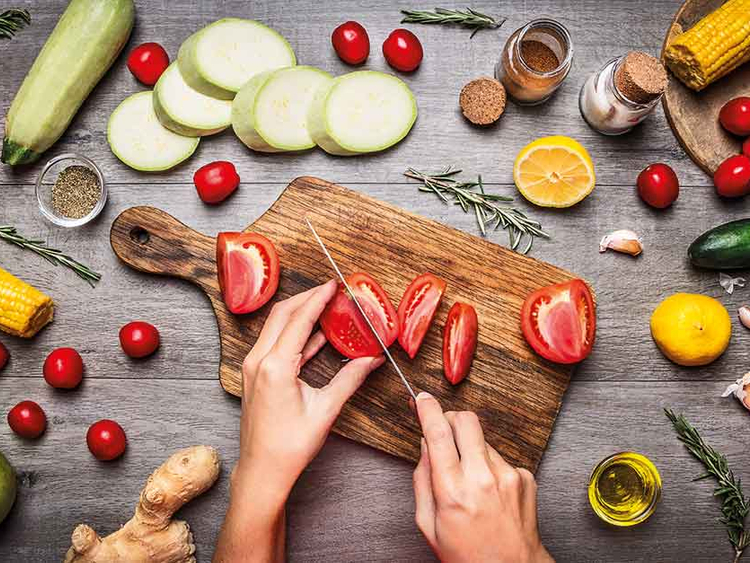Exercise and maintaining a healthy diet are the pillars of weight loss. This week we are going to take a look at meal prepping; for some it’s second nature and for others it’s an intimidating journey.
“Good nutrition does rely on good planning and consistency,” says Stephanie Karl, Nutritionist at JTS Medical Centre. “That is why a few easy-to-prepare recipes are a great back-up for busy lifestyles and most importantly remembering to keep your meal plans simple; it’s not like every meal has to be a party dish.” For busy people, Karl suggests making an evening meal double in size; the leftovers can become a smaller lunch to take with or eat when you are home. That way you can have chicken twice per week, fish twice, pulses twice and a meat dish twice. Salads are good accompaniments for taking with you and veggies at night offer some variety to meals. Shop for fresh items that are usually located around the edges of supermarkets. Frozen veggies are useful, canned tomatoes and pulses are essential items.
“I am big on soups and make a crock pot of it weekly for last-minute meals or a light late-night supper,” says Karl. “Other good protein recipes are a bean salad and a frittata for snacking and as a meal.”
Planning makes life easier
Prepping meals offers people a sense of control, when they plan ahead for the week they are taking control of what goes into their body. When you eat out there are hidden salts, sugars and flavouring that is not obvious. Prepping helps you make healthy choices.
“I am a project manager and this aspect of my job percolates into my personal life,” says 34-year-old Bahtim Ozok from Turkey. “I look at every task like a project. Working five days a week I feel the need to prep my meal in advance for the coming week and not spend too much time in the kitchen.
“Since my husband and I like to carry home-cooked lunches and eat dinners in, I usually create a weekly meal plan where I count the carbs, protein and then work around how much greens, pasta or rice is needed to complete the meal. Based on the meal plan, I calculate the time required to make my meals and how to multitask thus using my time optimally. I usually take three hours on a weekend to prep for the whole week,” explains Ozok.
Invest in your health
“Routine, routine, routine is the key to mastering meal plans,” explains Bella Kate, Integrative Health Coach. “Making the time and prepping your meals is an investment in your health and well-being.” She encourages her clients to set aside some time every weekend to prep for the coming week. “If you are consistent you are more likely to stick to it. Put some music on and enjoy yourselves. If you have kids who are old enough, get them to join in and help where possible.”
If you are new to meal prepping, then Bella’s advice is simple: “Make a shopping list in advance before you head to the supermarket to be clear on what you are going to buy. Stock up on Tupperware to keep your prepped food fresh and accessible, draw inspiration from recipe books, websites or Pinterest — there is so much free content available and most importantly make time every week, create a routine and stick to it.”
Prepping meals is a team effort
“In our home, planning and prepping meals is a team effort,” says Grzegorz Z., a 41-year-old engineer from Poland. “My seven-year-old son does not like all the healthy stuff we eat, so we constantly need to plan and experiment with our meals. I focus on the meat- and fish-based meals and my wife whips up the soups, salad and sweets.
“You are what you eat — I don’t want to sound like a weird person by saying this but I believe in this. If you eat food prepared by others outside you do not know how much salt, sugar and oil (and what kind of oil) they use. On the other hand, cooking meals at home means you will enjoy healthy and
tasty food.”
Organise yourself skinny
For people working long hours, cooking is the last thing on their mind after a long 8-12-hour shift and reaching out for takeaway or fast food is a reflex action and therein lies the danger.
Thirty-year-old Libby Johnson runs her own ballet studio and works long hours. Most days end for her at 9pm, so she doesn’t get time to cook in the evening. Johnson spends a couple of hours on a Saturday afternoon prepping her meals. “I started prepping meals five years ago and it helped me lose four stone. Having good, healthy food at hand means I never have to make too many decisions when I am tired and hungry and at the end of the week it is so worth it.”
She picks meals that can be done in bulk, e.g. vegetable and rice to ratatouille. “I measure out portions to freeze. I aim to experiment with one new recipe each week. This keeps my meals interesting and adds variety.”
Why should you be prepping meals?
The benefits of eating home cooked fresh meals far outweigh the effort it takes to prepare them. When you plan and prep your meals you tend to:
Cheat less When you prep your meals, you learn to purchase those items that are on the grocery list, this helps keep those little moments of weakness/impromptu buys under control
Saves money An average lunch costs anywhere between Dh20- 35 per meal. This can get quite expensive if you eat out everyday. If you spend some time planning your meals the night before, not only will you eat healthy, you will also save quite a bit of money each week on lunches and dinners alone.
Reduces wastage Did you know, roughly one third of the food produced in the world for human consumption every year — approximately 1.3 billion tonnes — gets lost or wasted. Prepping meals means that you can plan ahead and reduce food wastage.
Saves time Meal prepping helps you stay consistent and on track with healthy eating and also, gives you more time in the evenings to do whatever you want besides rushing in to cook!
Helps meet your fitness goals Planning our meal ahead of time teaches you to portion control and how to fuel your body with wholesome nutritional food so that you an continue to work out and chase your fitness goals.
Offers variety Eating the same meal can get monotonous, prepping meals allows you to plan in advance and also experiment with new recipes which can be a new way to add a bit of variety to your palette.
Beginners guide to prepping meals
• Make a shopping list Get everything in one shop
• Think protein first What you are having on each night rather than tonight it is rice, tomorrow pasta, etc.
• Buy small packs of meat products Around 100g to 200g is adequate per person
• Keep salads to basic recipes Liven up with an amazing dressing by adding Dijon mustard, anchovies, garlic
• Portion sizes Don’t overestimate the amount of carbs to be cooked at a meal. They are too easy to overindulge in. A fist size is the right portion per active person.
• Mind the fats Don’t fall into the trap that good fats can be consumed in larger amounts. 1 dessert spoon per person is enough at a meal
• Make a large pot of soup each week Freeze portions in plastic bags
• Keep protein snacks handy Eggs, sliced turkey, hummus, cheese, Greek yogurt and cottage cheese to avoid going for carbs and fat
• Waiting One plate of food is the guideline and waiting 20 minutes before thinking about topping up is good practise. Using chopsticks can slow down speedy eating.
• Eat 2 hours before sleeping to allow for digestion If this is not possible, take lunch as your larger meal and eat light. Late night eating tends to discourage breakfast and lunch becomes a huge meal.













